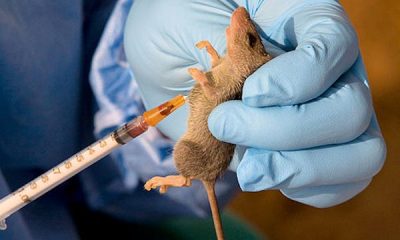Health
Pregnant women should be screened for diabetes before 14 weeks, say physicians

Gynaecologists and endocrinologists have recommended that pregnant women be tested for gestational diabetes as soon as they register for antenatal care, rather than waiting until the usual 24-26 weeks.
The experts emphasised that early testing and diagnosis are crucial to protecting both mother and child from the complications associated with gestational diabetes.
They warned that undetected and uncontrolled gestational diabetes in pregnant women increases the risk of miscarriages, preterm labour, bleeding during delivery, and intrauterine death of the baby.
Additionally, they noted that babies born to women with this condition could suffer from severe neurological and skeletal deformities, be born with type 2 diabetes, and face complications during delivery.
Gestational diabetes is any level of glucose intolerance or high blood sugar that begins or is first detected during pregnancy and returns to normal after delivery.
In many countries, women at risk of gestational diabetes were tested between 24 and 28 weeks of pregnancy.
However, a new study conducted by 28 academics from 13 countries and published in Lancet, revealed that testing and treatment before 14 weeks of pregnancy rather than 24 weeks of gestation, could prevent complications during and after pregnancy.
According to the World Health Organisation, diabetes is a chronic, metabolic disease characterised by high levels of blood sugar, leading to complications such as damage to the heart, blood vessels, eyes, kidneys and nerves.
About 422 million people globally live with diabetes and 1.5 million deaths are directly related to diabetes each year.

Health
Edo Govt Confirms 8 Lassa Fever Deaths, 56 Cases

Edo govt confirms 8 Lassa Fever deaths, 56 cases
On Jan 25, 2025
The Edo state Commissioner for Health, Dr Cyril Oshiomhole says the state has recorded 56 Lassa Fever cases and eight deaths between Dec. 30, 2024 and
Oshiomhole confirmed the incident on Friday in Benin while formally declaring the situation of Lassa Fever in the state.
“The 2025 epidemic year began on Dec. 30, 2024. Since then, 336 suspected cases have been reported, with 56 confirmed and eight resulting in death,” he said.
He said outbreak posed significant public health risks due to its rapid transmission potentials and severe outcomes if not effectively managed.
Oshiomhole revealed that 14 patients are currently receiving specialised care at the Lassa Fever Treatment Center in Irrua Specialist Teaching Hospital (ISTH).
He also noted that “In 2024, the state recorded 3,270 suspected cases, 292 confirmed cases, and 41 deaths, showing a decline from 2023 which recorded 65 deaths from 372 confirmed cases.”
According to him, the state has activated its Public Health Emergencies Response Management Team, collaborating with healthcare facilities, community leaders, and stakeholders to contain the outbreak.
As part of the response, measures include “enhanced surveillance, expanded treatment centers, Infection Prevention and Control (IPC), public awareness campaigns, and partnerships with health organisations.”
He urged residents to report anyone with symptoms like fever, weakness, headaches, vomiting, or bleeding to the nearest health facility for early detection.
The commissioner also tasked the response team to reduce the Case Fatality Rate (CFR) and assured of government support to enhance Lassa fever management efforts.
He further said the molecular laboratory at UBTH had been optimised for Lassa fever testing, increasing the state’s capacity with two testing centers at UBTH and ISTH.
-

 Entertainment11 months ago
Entertainment11 months agoReunion: Zubby is my G for life. Uncle Pete Edochie asked us to settle and I am happy we are cool now, says Excited Angela Okorie
-

 Health9 months ago
Health9 months agoEdo Govt Confirms 8 Lassa Fever Deaths, 56 Cases
-

 Entertainment11 months ago
Entertainment11 months agoReality Tv Star, Ebuka Obi Uchendu Celebrates Wife On Her Birthday Today ❤️🎉
-

 Entertainment12 months ago
Entertainment12 months agoSOME OF OUR FAVORITE NOLLYWOOD STARS WHO SHAVED THEIR HAIRS COMPLETELY TO FIT A PARTICULAR ROLE IN MOVIES
-

 Uncategorized12 months ago
Uncategorized12 months agoBaltasar Engonga has been fired as the Director General of Equatorial Guinea’s National Financial Investigation Agency.
-

 Politics12 months ago
Politics12 months agoWhy Kamala Harris won’t speak to supporters now
-

 Tech12 months ago
Tech12 months agoFictosexual’ Japanese Man Celebrates Sixth Marriage Anniversary With Virtual Wife
-
Politics11 months ago
Gov Ododo lauds troops for restoring peace in kogi community


